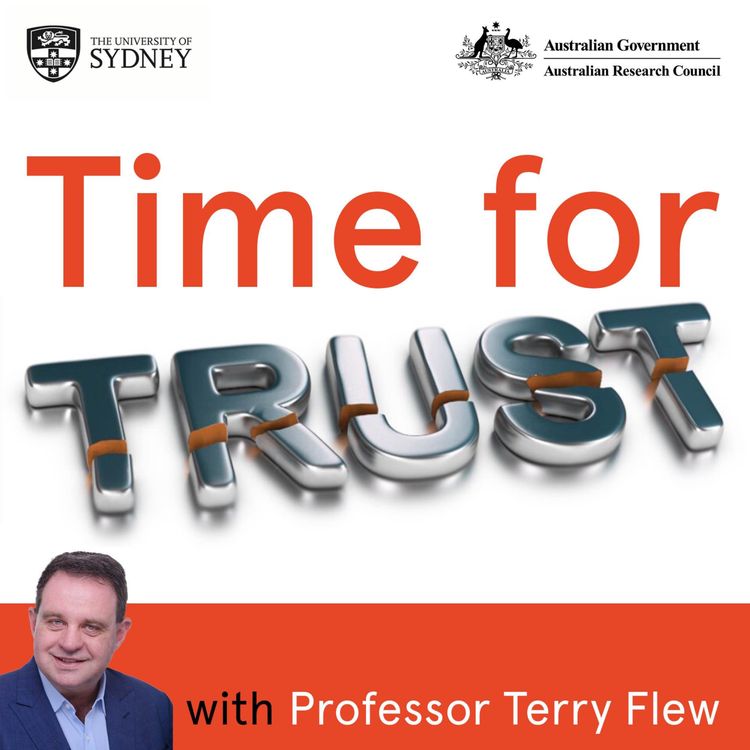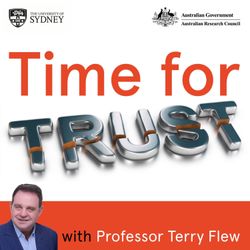Share

Time for Trust
Introducing Time for Trust
•
Governments, the economy and civil society depend on the public’s trust to work effectively – but this trust is declining in an age of polarisation and misinformation. The UN Secretary-General Antonio Guterres has warned that this “malady of mistrust” is as damaging as COVID or climate change.
We don’t talk much about trust – but we certainly notice when it breaks down, in corporate scandals or political coups. But in a time when many are losing faith in our most vital institutions, how can the bonds of trust be rebuilt?
In his new podcast, Time for Trust, Professor Terry Flew will explore these themes with leading experts on trust, from academics and journalists to community leaders, both from Australia and around the world.
More episodes
View all episodes

19. Prof Karin Wahl-Jorgensen on how boutique media are leveraging audience trust
39:52||Ep. 19Karin Wahl-Jorgenson is Professor, Cardiff School of Journalism, Media and Cultural Studies, Cardiff University where she has also been University Dean of Research Environment and Culture. She is the incoming President-Elect of the International Communication Association.Her research has been focused on the relationship between citizenship, media and emotion - and how it is affected by rapid technological change and innovation. She has recently been working on the experiences of local news entrepreneurs, and is currently developing a new research project on “boutique media”, including the appeal of news influencers, podcasters and Substack newsletters.She has written five books; Emotions, Media and Politics (Polity Press, 2019), Digital Citizenship in a Datafied Society (Polity Press, 2019, co-authored with Arne Hintz and Lina Dencik), Disasters and the Media (Peter Lang, 2012; co-authored with Mervi Pantti and Simon Cottle), Journalists and the Public (Hampton Press, 2007) and Citizens or Consumers? (Open University Press, 2005; co-authored with Justin Lewis and Sanna Inthorn). She joined Terry on the Sunshine Coast in Queensland, Australia where she was the keynote speaker at the Australian and Aotearoa New Zealand Communications Association conference.
18. Prof Andrea Carson on fake news, fact-checking and front pages
44:22||Ep. 18Professor Andrea Carson joins Terry for a wide-ranging discussion about trust in politics and the media which reports on it, from mis- and dis-information to the fate of fact-checking units and how our front pages impact Australian elections, along with the impact of AI and social media on our rapidly changing mediascape. She is Associate Dean, Research, Industry and Engagement with the School of Humanities and Social Sciences and a Professor of Political Communication at La Trobe University, specializing in the news media’s role in politics and quality of information in the public sphere.In 2024, she was a visiting research fellow at the University of Oxford with the Reuters Institute for the Study of Journalism, where she studied public trust in electoral bodies during elections, especially in the context of disinformation.More broadly, her research examines media trust, political communication, gender politics, and regulating digital platforms. She has worked on comparing different regulatory approaches to handling misinformation and disinformation. She has authored and co-edited several important books, including Investigative Journalism, Democracy and the Digital Age (2020) and Undercover Reporting, Deception, and Betrayal in Journalism (2023).
17. Prof David Nieborg on whether we can trust platform companies
39:54||Ep. 17In recent years, an increasing amount of cultural production has transitioned to platforms like YouTube, Instagram and TikTok. But can we trust these platforms to do the right thing by their creators and users – and what happens when these companies come into conflict with national governments, as has happened in Australia, Canada and elsewhere? David B. Nieborg is a Professor of Media Studies at the University of Toronto. He is a Senior Fellow at Massey College and a Faculty Affiliate at the Schwartz Reisman Institute. He held fellowships with the Jackman Humanities Institute and the Institute for Advanced Study in Princeton. His previous affiliations include MIT, the Queensland University of Technology, the Chinese University of Hong Kong, Utrecht University, and the University of Amsterdam. David published on the game industry, app and platform economics, and game journalism in academic outlets such as New Media & Society, Social Media + Society, Internet Policy Review, and Media, Culture and Society. He is the co-author of Platforms and Cultural Production (Polity, 2021), which is translated in Italian and Chinese, and Mainstreaming and Game Journalism (MIT Press, 2023). His teaching and research interests include social media, platforms, globalization, the media industries, games, cultural production and journalism.
16. Prof Terry Flew on how AI is changing communications
28:05||Ep. 16On Wednesday 20 August 2025, Prof Terry Flew delivered a guest lecture in Charles Sturt University's 'Thoughts On The Beyond' series, celebrating 50 years of communications scholarship at the university. Entitled 'AI and Communication: Trust, Ethics, Justice and Policy', the talk outlines some of context for, and themes of, the work Terry is doing as part of his ARC Laureate project researching mediated trust, with a particular focus on the significant impacts of AI.
15. Prof Alexandre Lefebvre on the liberal values that underpin social trust
47:31||Ep. 15Alexandre Lefebvre, Professor of Politics and Philosophy in the Faculty of Arts and Social Sciences at the University of Sydney, argues that liberalism isn't just a political ideology having to do with individual rights, parliaments, and courts. He says its core values permeate throughout much of our society, and offer a personal belief system that’s fundamental to many of us, whether religious or otherwise. Yet, at a time of increased populism and authoritarianism, these fundamental values – and the social trust that is built on them – are facing fresh challenges. Alexandre joins Terry to discuss these issues, which feature in his recent book, Liberalism as a Way of Life.
14. Prof Nick Couldry from the LSE on how social media has failed society
47:42||Ep. 14Nick Couldry is Professor of Media, Communications and Social Theory Emeritus and Professorial Research Fellow in the Department of Media and Communications at the London School of Economics and Political Science. As a sociologist of media and culture, he approaches media and communications from the perspective of the symbolic power that has been historically concentrated in media institutions. He is interested in how media and communications institutions and infrastructures contribute to various types of order – social, political, cultural, economic, and ethical.. In the past 10 years, his work has increasingly focussed on data questions, and ethics, politics and deep social implications of Big Data and small data practices. He is the author or editor of 17 books and many journal articles and book chapters.He has recently co-founded the Tierra Comun tri-lingual website (Englosh, Spanish and Portugese) to encourage networking with and among Latin American scholars and activists interested in data colonialism. Nick Couldry’s most recent book is The Space of the World: Can Human Solidarity Survive Social Media and What if it Can’t? It is the first of a three-book series titled Humanising the Future. We are at the International Communications Association’s 75th annual conference in Denver, Colorado, where we will discuss his most recent work.
13. Lizzie O'Shea on why digital rights are human rights
54:14||Ep. 13In recent years, many major companies, both in Australia and around the world, have conspicuously failed to protect their customers’ data, leading to personal details being shared on the dark web. Global platform companies have facilitated the spread of disinformation and misinformation, while their algorithms have contributed to the fragmentation and polarisation of society. But governments in some parts of the world have sought to force these companies to lift their game, imposing more rigorous standards that mandate the protection of privacy and user data. In Australia, the government has passed new laws including the creation of a tort for serious invasions of privacy and expanding the investigative and enforcement powers of the Office of the Australian Information Commissioner. Lizzie O’Shea is the founder and chair of Digital Rights Watch, an Australian non-government organisation which advocates for human rights protections in the digital world. Digital Rights Watch focuses on issues such as privacy, security, data rights, access to data and technology, and the role of journalism in holding technology companies to account.She also sits on the board of Blueprint for Free Speech and the Alliance for Gambling Reform. She’s a past recipient of the Davis Projects for Peace Prize and has been named a Human Rights Hero by Access Now. He 2019 book Future Histories: What Ada Lovelace, Tom Paine, and the Paris Commune Can Teach Us About Digital Technology was shortlisted for the Victorian Premier’s Literary Award. Lizzie is also a regular panellist on the Burning Platforms podcast alongside Peter Lewis who appeared on our first episode.
12. "A flashing warning light": discussing the 2025 Edelman Trust Barometer
39:00||Ep. 12The 25th anniversary edition of the Edelman Trust Barometer revealed that Australia has slipped into distrust territory with a profound global shift to acceptance of aggressive action and deepening fears giving rise to a widespread sense of grievance.We were delighted to co-host the launch of the 2025 Edelman Trust Barometer on 18 March. In collaboration with Edelman Australia and the Centre for AI, Trust and Governance, we brought together around 160 people at The Sybil Centre at the University of Sydney.This episode contains the panel discussion from the launch, facilitated by media commentator Tim Burrowes. Terry was joined on the panel by Kim Portrate, Milly Bannister and Jared Mondschein. This followed Terry's opening keynote address and a speech by Tom Robinson, CEO of Edelman Australia, that provided detailed analysis and insights from the Australian report – a separate conversation between Tom and Terry can be found in our previous episode.We highly recommend you download the report and find out more about the state of societal trust in Australia, and how it may impact your industry.
11. Tom Robinson on trust's decline and the rise of grievance
24:17||Ep. 11As we’ve discussed extensively on the podcast, trust in public institutions is declining. But how do we know this, and how do we measure how much things have changed? The international communications firm Edelman has been tracking this issue for 25 years, and its Edelman Trust Barometer has become one of the most authoritative global sources on trust in society. This year, their study has found that that globally, there has been what they term a profound shift to acceptance of aggressive action, with increased polarisation, deepening fears, and a widespread sense of grievance.The 2025 version of the Edelman Trust Barometer was released a few weeks ago, and the CEO of Edelman Australia, Tom Robinson, joins Terry to explore its findings in detail. Before joining Edelman, Tom spent more than a decade at MediaCom, working with high-profile brands on their marketing and content strategies. He also has extensive experience with digital media.